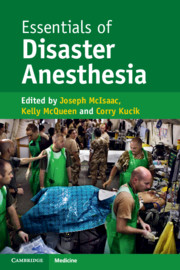Book contents
- Essentials of Disaster Anesthesia
- Essentials of Disaster Anesthesia
- Copyright page
- Contents
- Contributors
- Preface
- Disclaimer
- Chapter 1 Disaster Anesthesia
- Chapter 2 Preparing to Deploy to a Remote Disaster
- Chapter 3 Principles of Emergency and Trauma Surgery
- Chapter 4 Total Intravenous Anesthesia in Disaster Medicine
- Chapter 5 Inhaled Anesthetics and Draw-Over Devices in Disaster Response
- Chapter 6 Airway Management
- Chapter 7 Vascular Access, Hydration, and Fluids
- Chapter 8 Critical Care Delivery for Disasters in Austere Environments
- Chapter 9 Children in Disasters
- Chapter 10 Special Populations: Children
- Chapter 11 Laboratory Tests and Blood Banking
- Chapter 12 High-Altitude Physiology and Anesthesia
- Chapter 13 Disaster: Mental Health Effects, Responses, and What Clinicians Can Do
- Chapter 14 Considerations When Working with Children and Families
- Chapter 15 Chemical and Radiologic Exposures in Trauma and Disasters
- Chapter 16 Pain in Disasters
- Chapter 17 Radiology in the Austere or Disaster Environment
- Chapter 18 Communications
- Chapter 19 Security in Disaster Anesthesia
- Chapter 20 International Humanitarian Law
- Chapter 21 Operation Tomodachi: Anesthetic Implications
- Chapter 22 Austere Obstetric Anesthesia
- Chapter 23 Pharmacy in Disaster Anesthesia
- Chapter 24 Regional Anesthesia in Disaster Circumstances
- Chapter 25 Power and Light: Impact of Electrical Systems Failure on the Delivery of Anesthetic Care
- Book part
- Index
- References
Chapter 7 - Vascular Access, Hydration, and Fluids
Published online by Cambridge University Press: 23 June 2020
- Essentials of Disaster Anesthesia
- Essentials of Disaster Anesthesia
- Copyright page
- Contents
- Contributors
- Preface
- Disclaimer
- Chapter 1 Disaster Anesthesia
- Chapter 2 Preparing to Deploy to a Remote Disaster
- Chapter 3 Principles of Emergency and Trauma Surgery
- Chapter 4 Total Intravenous Anesthesia in Disaster Medicine
- Chapter 5 Inhaled Anesthetics and Draw-Over Devices in Disaster Response
- Chapter 6 Airway Management
- Chapter 7 Vascular Access, Hydration, and Fluids
- Chapter 8 Critical Care Delivery for Disasters in Austere Environments
- Chapter 9 Children in Disasters
- Chapter 10 Special Populations: Children
- Chapter 11 Laboratory Tests and Blood Banking
- Chapter 12 High-Altitude Physiology and Anesthesia
- Chapter 13 Disaster: Mental Health Effects, Responses, and What Clinicians Can Do
- Chapter 14 Considerations When Working with Children and Families
- Chapter 15 Chemical and Radiologic Exposures in Trauma and Disasters
- Chapter 16 Pain in Disasters
- Chapter 17 Radiology in the Austere or Disaster Environment
- Chapter 18 Communications
- Chapter 19 Security in Disaster Anesthesia
- Chapter 20 International Humanitarian Law
- Chapter 21 Operation Tomodachi: Anesthetic Implications
- Chapter 22 Austere Obstetric Anesthesia
- Chapter 23 Pharmacy in Disaster Anesthesia
- Chapter 24 Regional Anesthesia in Disaster Circumstances
- Chapter 25 Power and Light: Impact of Electrical Systems Failure on the Delivery of Anesthetic Care
- Book part
- Index
- References
Summary
Following a major disaster from which a large number of casualties result, a community’s ability to rescue, triage, transport, evaluate, and treat these casualties quickly and effectively leads to the best possible outcome. The best outcomes occur if treatment is judiciously applied within the “golden hour,” the 60 minutes following the injury to the patient.
- Type
- Chapter
- Information
- Essentials of Disaster Anesthesia , pp. 55 - 59Publisher: Cambridge University PressPrint publication year: 2020



